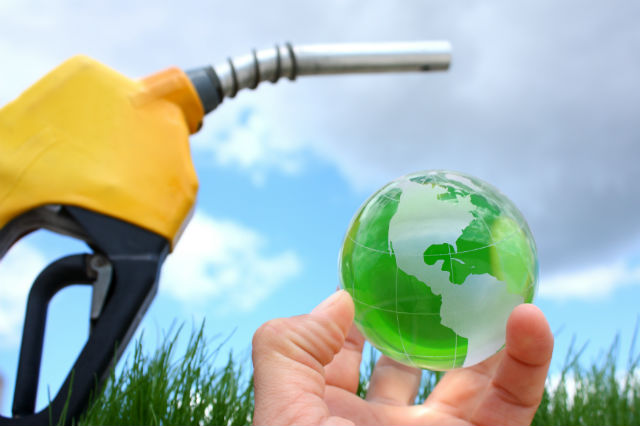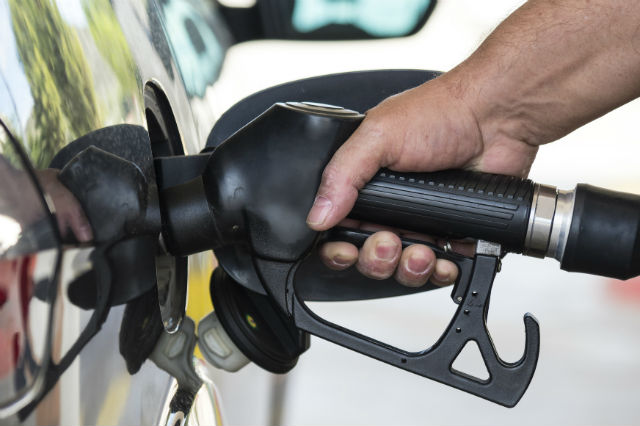It wasn’t too long ago that gasoline and diesel were the only two options to power your car. But these fuel types come with serious drawbacks including high cost and environmental hazards. With the increased need to use renewable fuel sources, several other options are being used more frequently – and more are continuing to emerge. With that in mind, here are a few of the most popular types of fuel for cars, and how to determine the right one for your vehicle.
Click here to check the current cost of gas in your state – updated weekly!
Gasoline
The most commonly used fuel for cars is gasoline. It is easily combustible, which allows for quick starting and fast acceleration. However, the high levels of carbon dioxide produced from burning gasoline is a leading contributor to pollution and, in turn, global warming. According to the Union for Concerned Scientists, cars and trucks account for nearly one-fifth of all U.S. global-warming emissions. In response, many companies and consumers are increasing their use of alternative fuel types.
There are generally three different types or “grades” of gasoline, determined by the gasoline’s octane level. A level of 87 is considered “regular,” 91 is “premium,” and 89 is mid-grade. The grade of gasoline you should use depends on the type of vehicle and engine you have. (More on that below).
Diesel
Along with gasoline, diesel is the other popular form of fuel, used specifically for diesel engines. Diesel vehicles are more fuel efficient, often traveling about 20% to 35% farther on a gallon of fuel than their gas-powered counterparts. Therefore, vehicles that are traveling far distances, such as trucks and vans, commonly use diesel engines. It also produces less carbon dioxide than gasoline. However, it does create nitrous oxide, which causes smog.
Liquified Petroleum
Better known as propane, liquified petroleum is a much cleaner and cheaper form of fuel. Many hybrid cars in foreign countries such as the United Kingdom have been designed to use propane. However, automobiles in the United States rarely use it. The only way to use propane domestically is to convert your vehicle’s gas engine.
Ethanol
Ethanol is a popular biofuel made from sugar cane, barley, corn and other natural resources. However, it is generally used as an additive in other fuel sources in order to help cut down on hazardous emission. According to the U.S. Department of Energy (DOE), more than 98% of U.S. gasoline contains ethanol, typically E10 (10% ethanol, 90% gasoline).
But gasoline with higher percentages of ethanol also exist. E85, also called flex fuel, is an ethanol-gasoline blend containing 51% to 83% ethanol. E85 can only be used on Flex Fuel Vehicles, which are specially designed to run on gasoline, E85, or any mixture of the two. Ethanol can be extremely helpful in cutting down on emissions but a car’s fuel delivery system and engine need to be designed to use it.
Compressed Natural Gas
Compressed natural gas is a clear, odorless and non-corrosive gas that can be used in liquid or gas form to run a combustion engine, though gas engines would need to be converted to use it. The fuel produces approximately 80% less emissions than gasoline. Additionally, vehicles that run on compressed natural gas are similar in power, acceleration, and cruising speed to gasoline or diesel vehicles. Compressed natural gas can limit driving range, though, as less overall gas can be stored in the same size gas tank.
Biodiesel
This renewable, biodegradable liquid fuel is made from vegetable oils, animal fats or recycled cooking grease. According to the DOE, biodiesel emissions are 74% lower than those from petroleum diesel. Diesel vehicles can generally use a low percentage of biodiesel without any engine modification. However, higher levels of the fuel will require modifications.

Determining the Type of Fuel for Your Car
Gasoline vs. Diesel
Most vehicles in the United States run on gasoline or diesel fuel. The driver’s manual should dictate the fuel type your car needs. There should also be a label on the fuel door that reads something along the line of “Diesel Fuel Only” or “Unleaded Gasoline Only.” If there’s ever a doubt, call the manufacturer.
It is imperative that you put the proper fuel in your car’s tank. Gas engines cannot combust diesel fuel and vice versa, so the car won’t start if it is filled with the wrong fuel type. Even worse, it can cause serious damage to the engine.
AAA Approved Auto Repair Facilities can help get your car back out on the road. Find the nearest one here.
Regular vs. Premium
As stated previously, gasoline grades are dependent on the fuel’s octane level. Higher octane levels ensure the gas burns evenly, which helps keep your engine cleaner and improve performance. Therefore, it is commonly used in vehicles with high-compression engines or turbochargers, like sports cars.
The car’s manual should state the gasoline grade needed. It may suggest premium gas but not require it. If this is the case, your car should be able to run fine with lower grade gas, and it could save you money.
The Future of Fuel
Internal combustion cars are and will continue to be the popular vehicles, but electric cars continue to grow in popularity. Currently electric vehicle sales are about 3 percent of all the vehicle sold, but that could change quickly. Ford General Motors and Stellantis Corporation have a goal of having up to 50 percent of the vehicle sales being electric in just 9 years.
Further in the future we could see a more popularity with hydrogen. Hydrogen is stored in a onboard tank and that hydrogen goes through a fuel cell and makes electricity to run the electric motor(s). The byproduct of hydrogen combustion is water. Unlike battery electric car, hydrogen cars refuel much quicker.
AAA members can save money at the pump with Shell’s Fuel Rewards program. Learn more.
Motorists can find the cheapest gas prices wherever they are by using the AAA Mobile App.
24 Thoughts on “Different Types of Fuel and What’s Best for Your Car”
Leave A Comment
Comments are subject to moderation and may or may not be published at the editor’s discretion. Only comments that are relevant to the article and add value to the Your AAA community will be considered. Comments may be edited for clarity and length.














On the recent tv program (engine masters) they did extensive dynamometer runs using different grades of ethanol. While they were concerned primarily about differences in HP gains , they also stated info about the fact that standard carburated engines should not be running on ethanol. The reason stated was that these carbs are not computer regulated and therfore will not run efficently, (get poor mileage mainly and could damage the fuel system (fuel lines,hoses,fuel tank, and carb. I have experienced fuel tank corrosion,gas tank gauge failure, and carb accellerator pump dissintegration. Costly mistake by a chevy certified master tech. ME
Thanks for pointing out that higher octane gas burns evenly and thus helps keep the engine cleaner. Keeping the engine clean is essential in maintaining its performance. But I don’t think it’s a good idea to use premium gas on regular gas cars.
Read the owner’s manual that came with your vehicle. If it states “87 octane or higher,” you can burn 87, 89, or 93. You may find that if you burn the high octane, the on-board PCM will advance the timing of the engine to meet the higher octane fuel, and you might get better engine performance, and better fuel economy. This is the case with my 2010 Chevrolet 2.4 Malibu. I also use a fuel additive at fill-up. (4 ounces of MMO to 10 gallons of fuel.) Do not use a lower octane fuel in your engine, than specified in the owner’s manual. You can do some serious damage to your engine.
I have a 2009 Toyota Prius Hybrid with Synergy Drive. I use regular gasoline. Recently I spent some time revising “how to drive a hybrid” using some of the many youtube videos online. This was indeed time well spent. Who knew that I had not been doing things right? For the last 500 miles my mpg is now 53.1 MPG. My new goal is 55 mpg. I am confident that I can do it. Don’t believe me? https://www.facebook.com/photo/?fbid=7877167515628397&set=a.211207115557847
Fuel is one piece of the problem. Driving style is also a consideration.
Great promo for gas and diesel. I’ve got a10 yo. 4 cyl. hatchback originally MSRP’g at 25k still getting me 35mpg allowing me to go cross-country anytime I want without the hassle of locating charging stations at which to sit for hours on end. You can’t come anywhere near close to beating those metrics and logistics in the EV world. Looking for my next gas replacement for that now.
There is no such thing as global warming and I take offense as you promoting it. The earth warms, cools, does its thing according to it nature, which man has no control over. However, man thinks he’s god and can foster energy measures that line his coffers while trying to fool the people. We need energy and not electric to run cars. It’s a scam and I’ll keep my car and the rest can buy into this obvious slight of hand.
No such thing as global warming??? Do you even know what the term means.
Of course, though, the earth is flat, no on has ever landed on the moon (which is made of green cheese) and dinosaurs never existed.
Thank you, Joan. Finally someone with common sense.
Regarding the Octane Level: what is the down side of running Regular Gas (87) instead of High Octane 93? 2nd questions: Are you damaging the engine?
Completely agree with johnm304’s comments on this article from August 2019. Unfortunate that a year and a half later, this article has not been updated, even with the rise in electric vehicle (EV) sales and automakers signaling a shift to EVs. I took a 7500 mile road trip across North America in 2019 in my EV and will never go back to gasoline. EVs are just better cars.
For those interested, I should have mentioned that I documented that trip at https://www.pathbalance.com.
A reference to Top Tier-graded gasoline would be helpful. I’ve read Consumer Reports’ discussion of it and it seems like the best choice.
I have a 1.4L intercooled turbo engine and the manufacturer states that premium is recommended. I have been using premium but could I get away with a lower octane gas ? Thanks
Hi John, here is an answer from our Car Doctor John Paul:
AAA has performed extensive testing on vehicles where it is recommended,not required, that premium fuel is used. What we have found in almost every case there was no difference in performance and fuel economy. In the cases where there was a slight drop in fuel economy, the cost savings of regular fuel over premium fuel offset any slight drop in fuel economy.
Of course if your car requires premium fuel, you need to use it.
In my own personal testing I have never noticed any differences in performance or fuel economy.
Excellent presentations, comments and “debates”.. especially useful for those of us who simply start the car and drive. Thanks
I am really disappointed that this article did not cover the king of the alternate fuels — electricity. None of the fuels covered have matching passenger vehicles from the major manufacturers. But electric vehicles (EVs) are available from several automakers. First generation EVs are excellent commuter vehicles and the second generation EVs have over 200 miles of range and can charge in the time it takes for a road trip “bio break”. I hope the omission of EVs from this article was accidental and does not reflect a bias in favor of fossil fuels.
Great topic, but you forgot to include all of those items like the lawn mower, tiller, weed wacker, etc. Using Ethenal in the gas can screw up the carburater in just 1 season.
Hi Richard, we were trying to keep the focus on car engines but you are certainly right — ethanol can damage smaller engines. Thanks for your input!
Saying that ethanol can be used in cars designed for gasoline is misleading and potentially costly advice to your members. If a car is not designed for so-called flex fuel (E85), the gas tank and fuel line components can be severely damaged. Seeing as most gas stations sell E85, this article implies that it would be ok to use in any gas powered car. You should clarify and issue a correction
Hi Fred, you’re absolutely right–it was misleading. We have updated the article to include flex fuel. Thanks for your input!
Very helpful.
I was disappointed that you failed to warn readers of the dangers to small engines of using Gasoline containing Ethanol. I believe this now an undisputed problem – the denial is therefore usually political. Can you please enlighten me?
Thank you,
Geoffrey Brookman.
PS. I am fortunate to live in a state where no -Ethanol fuel has limited availability rather than none.
Hi Geoffrey, thanks for the comment. We tried to keep the focus on car engines but you are correct about ethanol’s effect on small engines. Here is a response from our Car Doctor, John Paul: In small engines such as lawnmowers and other power equipment, higher concentrations of ethanol can be very corrosive to carburetors. In addition the higher concentration of ethanol can cause hotter running conditions and potential engine failure. At AAA we believe that ethanol can help us continue toward energy independence, but the fuel delivery system and engines need to be designed to use it.
You write as though ordinary consumers have a choice when it comes to ethanol in gasoline, both in autos and smaller engines. When one goes to a gas station, one has to take whatever ‘flavor’ they’re pumping; in any locality, it’s the same percentage of ethanol.
Also, a comment on your use of the words propane and ethanol: they’re specific organic chemical compounds (ethanol is the “alcohol” in alcoholic drinks) .
It’s not complicated.